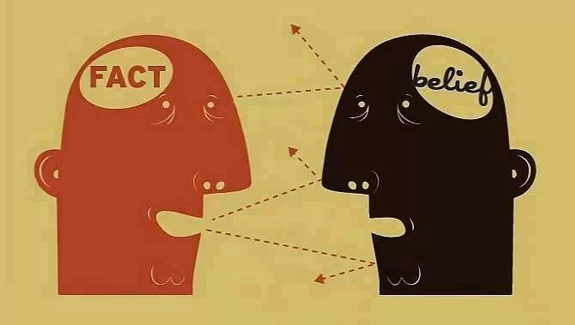
Confirmation bias is the tendency to search for, interpret, favor, and recall information in a way that confirms or supports our prior beliefs or values. We tend to unconsciously select information that supports our views, but ignore non-supportive or contradicting information. We also tend to interpret ambiguous evidence as supporting our already existing position. This effect is strongest regarding our desired outcomes, for emotionally charged issues, and for deeply entrenched beliefs.
We are all susceptible to this approach.
This is one of the most significant factors that is contributing to our current divisions in our culture. So many of the most complex issues we view through cut and dried, either/or filters, even before we turn on our preferred news source or social media platforms (which have algorithms designed to feed us things with which we have already shown our interest through every click). This only inflames our bias.
We so deeply believe that we are on the right side that anything that sounds even remotely like the other side, is automatically assumed to be not only wrong, but evil. In this mindset, objectivity is lost. Not only are we then unable to sustain truthful and discerning discourse with one another, we as the general public are unable to hold our leaders accountable when they spread falsehood. When those two factors are in play, enemies are made, fear takes hold, and things quickly devolve into chaos. Everything becomes a battle and everyone a potential enemy.
This is not the way, especially for Christians.
We have been so convinced that there is a totally good side, a totally evil side, and there is nothing in between. We conclude that the side we have chosen is the good side and thus conclude that “the other side” is totally evil. The powers that be, numerous media outlets, as well as social media influencers play on this deep seeded bias. It plays to our deepest emotions and fears and we quickly get caught up in what we consider a “noble fight” of “our side” forgetting that the “other side” are also human beings created in the image of God.
Human beings are deeply beautiful, complex, and nuanced, which means our world is as well. Reducing this complex nuanced world to categories of “either/or” is simply the methods of people who desire power and control rather than love, joy, peace, forbearance, kindness, goodness, faithfulness, gentleness and self-control. (Galatians 5:22-23).
So what are some small steps we can take to make a more positive impact on this trend?
-Resist getting and spreading information from memes, social media influencers, Facebook groups, and YouTube channel hosts, and all other self proclaimed pundits. While some information from these sources might be helpful, they are often emotionally charged and reactionary, leading us to confirmation bias.
-If you find yourself immediately agreeing with information, ask yourself why you are agreeing so quickly. What factors have led to such quick agreement? Do your best to go and listen to the conversations being had from the opposite perspective. Ask yourself why you might be disagreeing so quickly. What factors have led to such quick disagreement? Are we able in that moment to think beyond emotion and pre-existing beliefs to see things objectively and from another’s point of view?
-Give yourselves time to contemplate. If you’d like to share or post something, think on it for a few days. Fact check the claim several times from several sources and measure the multiple conclusions you find against one another. Read an academic, peer reviewed historical perspective on similar issues. Has an event like this happened before? How did the culture respond to it then? How should they have responded to it? How should that shape the way we respond to the events of our day?
-Look up the biases behind the news media by those who are devoted to assessing such things. I have found the statistical findings of Allsides.com helpful this year in showing the grid of bias from all sides of the political spectrum regarding news media sources. You can find that work here: (https://rb.gy/epthlx).
-Talk with each other, not at each other. Confirmation bias sets up a false narrative that when someone disagrees with our belief they must fervently believe the opposite, which often isn’t true at all. They may simply believe it differently. When we are not proactive in embracing nuance, it causes us to be people who are trying to convert others to our immovable beliefs, seeing them as something to be conquered rather than being compelled by an authentic desire to come together and conquer our problems in solidarity.
-Finally, it’s not our job to change the mind of every person we encounter, but it is our responsibility to love them. Love includes setting healthy boundaries and discerning when to engage and when not to. When you enter conversations with those who refuse to change their minds and insist on being confrontational, it’s vital to chose opportunities of engagement wisely. God really does love everyone deeper than we ever could and God is constantly bringing people into our lives to speak wisdom and truth, but it’s up to each person to choose to listen. We have all been entrenched on things we shouldn’t have been at times. Ask yourself what has brought you out of those entrenched beliefs? Was it through harsh rhetoric or someone you trust, calmly asking you really good questions and walking with you to process the answers? Some won’t let us do that with them and we individuals can’t be that for all people. Being wise on interacting with those who welcome you and with those who don’t, leave the work for someone else they do trust that God has brought in their life will save you both emotional energy and relationships.
It won’t matter how many technological advances we make as a society. If we can’t even think, act, and talk with one another in love, joy, peace, forbearance, kindness, goodness, faithfulness, gentleness and self-control, we will continue to advance division rather than solidarity.
May this begin with me.
May this begin within the church.



